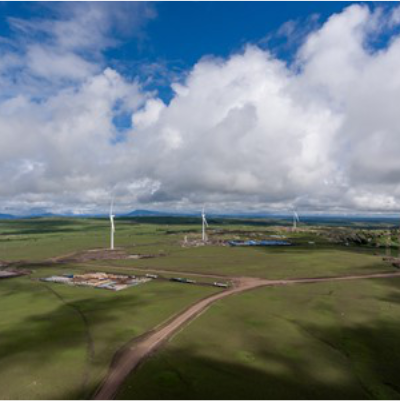BTE Renewables
BTE Renewables (rebranded in 2021 from BioTherm Energy) is a pan-African renewable energy platform, composed of close to 400MW of power capacity across five energy assets in South Africa and Kenya, with plans to expand to other countries in the region.
Kipeto is Kenya’s second largest wind farm and supplies 100MW of clean energy to the national grid as a significant contribution to Kenya’s Vision 2030 and Big Four Agenda. The project is composed of 60 GE 1.7-103 wind turbines and involved the construction of a 17km (220KV) transmission line to carry the power to Isinya substation in Kajiado County, providing power to the equivalent of approximately 40,000 homes in the region.
The balance of the assets in the portfolio are in South Africa. These include Golden Valley, a 123MW wind project in the Eastern Cape; Excelsior, a 33MW wind project in the Western Cape; Aggeneys, a 46MW solar project in the Northern Cape; and Konkoonsies II an 86MW solar project in the Northern Cape
BTE Renewables’ investment thesis is consistent with Actis’ track record and approach to investing in the renewables power sector across Africa:
- Fast-growing African economies: GDP growth in Africa is expected to average 4% from 2022 to 2025, driven by factors such as economic reforms, favourable demographics, urbanisation and a rising middle class, resulting in greater domestic consumption.
- High level of latent demand for electricity: Demand is growing in Africa at 7-8% p.a. with large supply/demand gaps. Over 600 million people across Africa have no access to electricity. Connecting them to the grid and adequately serving those already connected is a core objective for governments and other stakeholders.
- Increasingly attractive investment climate for renewable power: Solar and wind are cost-competitive with traditional fossil fuel-based power plants and are quicker to deploy given the absence of a fuel supply chain. Simultaneously, African governments are implementing stronger regulatory and procurement frameworks to facilitate private sector investment to bridge financing gaps.
- Commercially competitive sector: renewable power is commercially competitive with other forms of generation in many markets across Africa, especially given a high reliance on expensive, short-term, oil-based generation.
Actis’ operational experts ensure that BTE Renewables follows international best practices in due diligence, engineering, procurement, and construction (EPC) contracting and financing. This also enables the platform to benefit from Actis’ global renewable energy experience.
Actis has created a sustainability leader in BTE Renewables. Benefiting from Actis’ deep experience in the South African market, the team is working with other industry participants (including Actis company, Lekela), in the launch of INSPIRE (https://inspire-excellence.net/), a renewable energy education and training hub. In Kenya, BTE Renewables has partnered with The Nature Conservancy (TNC) to raise a biodiversity-linked loan product, incentivising conservation efforts for endangered birds in the Kipeto project area. Both initiatives go beyond the letter of the law to maximise the potential of community and environmental programmes for transformational, long-term impact.
